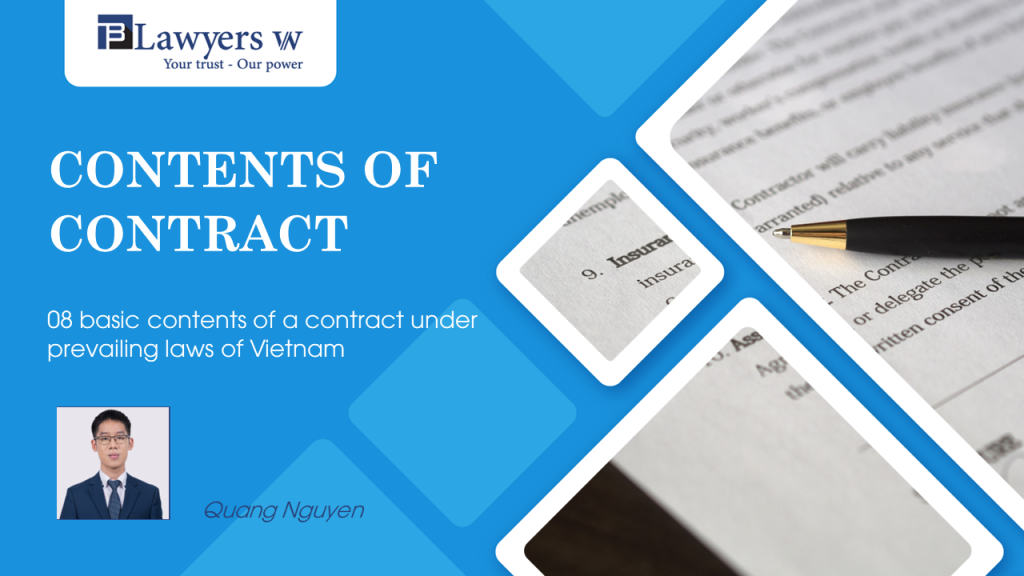Nowadays, in almost every transaction, the parties enter a contract in writing to record their agreements.
Through this article, BLawyers Vietnam will introduce the basic contents of the contracts in accordance with the regulation of the prevailing Civil Code and some notes from our practical experience of supporting the clients.
1. Information about the subjects entering the contract
This content is an indispensable part of the contract. In this section, the parties should record the following basic information:
- Full name of the contracting party (in case the subject is an organization, add information about the legal representative of that organization);
- Contacting address;
- Contacting phone number;
- Email;
- Some other information depending on the nature of the contract. In some cases, if necessary, the parties can record additional bank account numbers for convenience in transactions.
Of note, the information about the contracting party should be recorded accurately to avoid the verification process when settling disputes.
2. The object of the contract
The object of the contract is what the parties aim to achieve through the contract.
For example: In a sales contract, the object of the contract is the goods that the seller wants to sell, and the buyer wants to buy. In a service contract, the object of the contract is the service of the provider to the service user.
Of note, the parties need to identify the object of the contract to ensure the contract’s performance according to the agreement.
3. Quantity and quality of the contract object
The parties need to specify and detail the quantity and quality of the object of the contract. This will help to clearly define the obligations of the obligor and limit unnecessary disputes.
4. Price, payment method and payment time
Per our experience, this is the content that the parties may not write clearly, leading to one party delaying the payment or not making the payment on time leading to a dispute. Therefore, it is necessary to specify this content in the contract.
5. The term, location, and method of contract performance
This content creates a consensus on the understanding of the parties when implementing the objectives of the contract. The content will answer the questions of “When?”, “Where?”, “How to achieve the objectives of the contract?”, etc. when the parties perform the contract.
6. Rights and obligations of the parties
Recognizing clear rights and obligations of the parties in the contract will help the parties know what they must or must not do. In addition to the rights and obligations prescribed by law, depending on different types of contracts, the parties may discuss other rights and obligations as long as it does not violate the prohibition or are against the law.
Of note, this content can be gathered in a single clause, or it can be scattered across the clauses of the contract, depending on the drafting.
7. Liability for breach of contract
To further ensure the rights and interests of the parties and to ensure the correct implementation of the agreement in the contract, the parties should agree on the conditions for fines for violations and compensation for damage.
Note: Fine for violations and damage compensation are two different things. If there is damage due to a breach of an obligation, and at the same time the contract also has an agreement on penalties for violations, the violating party must both compensate for the damage and pay a penalty. The parties need to agree on these two issues in the contract.
The issue of penalty for violation can be applied together with the continuation of the contract if the case of violation does not fall under the cases where a party is entitled to unilaterally terminate the contract.
8. Dispute settlement method
Currently, many contracts have no provisions or sketchy provisions on dispute resolution methods. At that time, the parties will lose more effort or time to agree on the method of dispute settlement (if commercial arbitration is chosen) or there is no other way to bring the dispute to the Court for settlement.
In addition to resolving disputes at the Court, there are many dispute resolution methods with different advantages and disadvantages such as: mutual agreement, mediation, or commercial arbitration. The parties should consider this in advance to save time and costs depending on their capabilities and ensure the relationship between the two parties when a dispute occurs.
9. Some other necessary content
In addition to the contents regulated by the law above, the contract also needs to have the following common contents:
- Time of starting the validation of the contract: Unless otherwise agreed, the contract takes effect from the date of signing;
- Termination or unilateral termination of the contract;
- Confidentiality of information and not disclosed to third parties;
- The language of the contract and the use of priority language in case there is a difference between two or more different languages;
- The transfer and inheritance of obligations are mentioned in the contract.
The above is not official advice from BLawyers Vietnam. If you have any questions or suggestions about the above, please contact us at consult@blawyersvn.com. We would love to hear from you.
Date: 19 October 2022
Writer: Quang Nguyen

